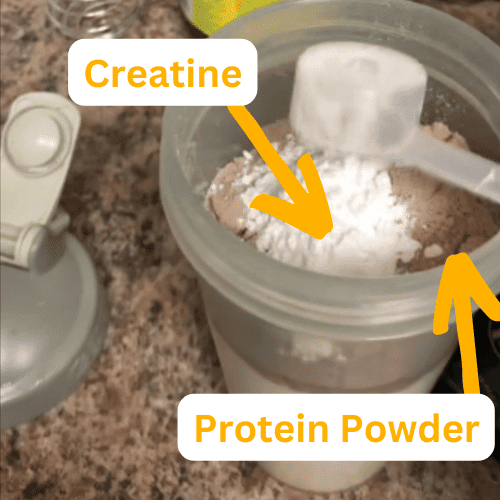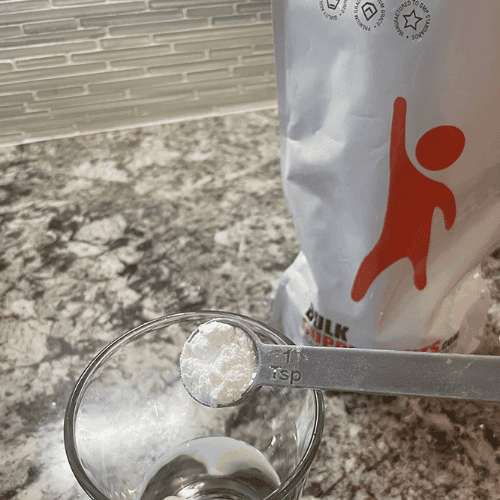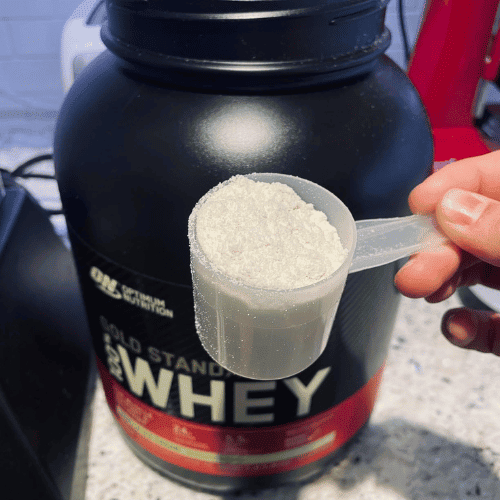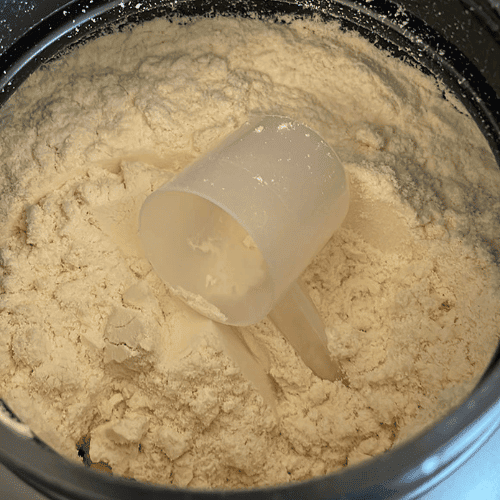Creatine and protein powder supplements help improve strength, increase lean muscle mass, and promote muscle recovery after a workout. But can you mix creatine with protein powder? And is it better to consume the supplements separately or together?
This article will answer the question and break down the facts behind it.
- Can You Mix Creatine with Protein Powder?
- What is Creatine?
- What Are Protein Powders?
- The Science Behind Mixing Creatine and Protein Powder
- How to Mix Creatine with Protein Powder
- Potential Side Effects and Considerations
- Frequently Asked Questions
- Can you take creatine and protein powder at the same time?
- Does creatine affect protein absorption?
- Is it safe to mix creatine with whey protein?
- Can you mix creatine into a protein shake?
- What should you not mix creatine with?
- What is the best drink to put creatine in?
- Can you mix creatine with milk?
- Is creatine better with water or milk?
- Recap
- Conclusion
- Protein Calculator: How Much Protein Do You Need Per Day?
Can You Mix Creatine with Protein Powder?

What is Creatine?


Creatine is an amino acid found in the muscles and the brain – but the body usually stores creatine as phosphocreatine in the muscles, where it’s used for energy. Creatine supplements provide a continuous energy supply by keeping production up in working muscles, with 95% stored in the skeletal muscle and used during physical activities.
With its benefits considered, it’s an essential supplement for fitness enthusiasts and athletes to do more sprints or reps during their workouts, resulting in greater gains in strength, muscle mass, and performance.
Benefits Of Creatine Supplementation
Taking creatine is effective at augmenting training workouts and increasing muscular strength and lean body mass, as various studies have revealed, especially when combined with various training exercises.
Aside from increasing strength and muscle mass, it also helps:
- Slow down skin aging – One study found that creatine (via dermal penetration, among other ingredients) to the face daily for six weeks can reduce sagging and wrinkles among male subjects.
- Reduce oxidative stress – Creatine effectively protects the mitochondrial DNA from oxidative damage. Some experts also consider creatine as a direct-acting antioxidant that can scavenge ROS superoxide radicals.
- Maintain bone health – Studies show that creatine supplementation might help reduce age-related skeletal muscle, prevent the decline of bone mineral density, and ease the effects of osteoarthritis and other bone-related diseases.
- Protect and benefit the liver – Creatine supplementation can reduce fat buildup in the liver and prevent the risk of conditions like fatty liver, non-alcoholic liver disease, and hepatic damage.
- Improve brain function – Creatine, according to various studies, can improve performance during cognitive tasks like critical thinking, focus, and memorization, especially among older adults who suffer from age-related reduced brain functionality and neurological diseases.
Several studies show that creatine supplementation is effective at augmenting training workouts and increasing muscular strength and lean body mass. One study found that taking 20g of creatine four times a week helped maintain physical strength (even without using a barbell).
Creatine Food Sources
People can get creatine through specific food sources, although they don’t contain the same amounts as commercially-manufactured supplements. Foods with creatine include:
- Herring
- Chicken
- Pork
- Beef
- Salmon
- Eggs
- Milk
- Leafy vegetables
- Nuts
What Are Protein Powders?


Protein powders are essential for physically active individuals – athletes, bodybuilders, and fitness enthusiasts, whose goals include aiming for greater muscle mass, faster muscle recovery, and achieving greater physical performance.
While protein isn’t a direct source of energy per se, it can help increase energy levels by metabolizing protein as an energy source, especially if you’re deficient in carbohydrates, or having a prolonged calorie deficit.
A complete protein contains all nine essential amino acids (histidine, isoleucine, leucine, lysine, methionine, phenylalanine, threonine, tryptophan, and valine) in equal amounts.
Types Of Protein
There are different types of protein powders, namely:
- Whey – One of the more sought-after protein powders, whey protein is a mixture of proteins isolated from whey, which is the liquid part of milk that separates during cheese production and is best known for its ability to effectively boost muscle growth and recovery. It’s available in two forms – whey concentrate and whey isolate.
- Casein – Like whey proteins, casein is also a milk protein found in milk and is responsible for giving milk its color. It can also increase muscle mass growth, but unlike whey, it’s digested more slowly than other proteins, which can effectively curb one’s appetite better.
- Egg – Both the egg white (albumen and the yolk contain protein, but while the yolk has the more significant concentration of protein, the amount of egg white is greater so it provides more.
- Plant-based proteins – Plant-based sources of proteins include soy, peas, quinoa, beans, hemp, seeds, and rice. Most plant-based protein sources (with the exception of soy, quinoa, lentil, and chia seeds) have incomplete amino acid profiles but are completed when mixed with other plant-based proteins.
The Science Behind Mixing Creatine and Protein Powder
Can you mix creatine with your protein powder? – Yes, you can mix creatine and protein powder. In fact, many people choose to take creatine and protein powder together as part of their fitness routine. Here’s why:
Mixing protein powder and creatine is a convenient and beneficial way to improve one’s physical/athletic performance. Combining them creates a synergistic effect – the protein stimulates muscle protein synthesis, while creatine increases strength and muscle mass by increasing exercise capacity. But it doesn’t stop thereâ¦
Benefits Of Mixing Protein Powder With Creatine
Here are some scenarios where it might be more beneficial to mix protein powder and creatine, as opposed to taking them separately:
Post-Workout Gains & Recovery
Studies show that taking protein and creatine supplements after a workout is more effective and recommendable since it’s at that period when the muscles tend to absorb more nutrients, making them more conducive for lean muscle mass growth and muscle recovery.
Weight Loss Management
For those looking to gain muscle mass while losing fat, consuming a mix of protein and creatine can be beneficial, as studies have found them to help reduce body fat percentage. Protein (particularly low-sodium protein) helps promote satiety and appetite reduction while combining creatine supplements with resistance training helped burn fat more effectively.
Pre-Workout Energy Boosters
Creatine and protein are also effective as pre-workout fixes – Creatine provides energy, helping you build more strength and improve performance during high-intensity workouts, while protein powders provide a steady supply of all the essential amino acids and branched-chain amino acids to prevent muscle breakdown and provide ample nutrition to last through the workout.
Taste and Palatability
Others prefer to mix their creatine supplements with flavored protein powder to mask the taste of creatine, which others may find unappealing, making it more palatable and easier to consume. Some brands offer a diverse selection of protein powder flavors to help make supplementation more consistent and enjoyable.
Convenience and Consistency
Mixing both creatine and protein powder together ahead of time makes it easier to take both supplements in one gulp, especially for people who may have busy schedules or those who may find the taste of creatine unpleasant, that way it ensures consistency, which allows for both substances to yield more visible, optimal results.
How to Mix Creatine with Protein Powder
Here’s how you can prepare your creatine x protein powder mix:
- Prepare a blender and fill 200-300 ml of water or milk.
- Toss in 1-2 scoops of protein powder (depending on the product’s serving suggestion)
- Add the prescribed amount of creatine to the mix
- Close the lid on top of the shaker and blend the contents for up to 15 seconds.
- Pour the contents into a bottle or shaker and serve.
Tips
- In the absence of a blender, use a shaker instead
- You can add oats or any fruits to improve the taste and absorption of creatine
As a pre-workout – You can drink your protein shake 30 minutes before a workout to help the body digest the shake better and prevent stomach cramping.
As a post-workout – The shake should be taken half an hour after a workout since this will help to maximize the benefits of taking these supplements.
Protein Calculator: How Much Protein Do You Need Per Day?
Our Personalized Protein Intake Calculator is a user-friendly online tool designed to provide an estimated daily protein requirement based on your body weight. This can be a helpful resource for those looking to optimize their diet for general health or specific fitness goals.
How to Use It:
Using the calculator is easy:
- Input your body weight in pounds (lbs) into the designated field.
- Click on the “Calculate” button.
- The calculator will then provide you with a range of your estimated daily protein requirements in grams (g). This range represents the minimum and maximum amounts of protein you might need depending on your level of physical activity and health status.
Remember, while this calculator provides a convenient way to estimate your protein needs, it should be used as a guide and does not replace professional nutritional advice. Always consult with a healthcare provider or dietitian for personalized dietary planning.
How To Read Your Results
The minimum and maximum values in the protein intake calculator are based on the range of protein intake recommendations for average adults, which are typically 0.8g to 1.6g of protein per kilogram of body weight per day.
Minimum Protein Intake
The minimum value represents the lower end of this range, which is approximately 0.8g of protein per kilogram of body weight. This is the general recommended dietary allowance (RDA) for protein for average adults to meet basic nutritional requirements. This amount is enough to prevent deficiency, but it may not be sufficient for individuals who are very active, those who are recovering from injury or illness, or those who have other specific health needs.
Maximum Protein Intake
The maximum value represents the higher end of the range, which is approximately 1.6g of protein per kilogram of body weight. This amount is often recommended for people who are more physically active, especially those who are involved in regular strength training or endurance activities. Consuming this amount of protein can help support muscle repair and growth, enhance recovery, and optimize physical performance.
In addition, higher protein intakes can be beneficial for individuals trying to lose weight, as protein can promote feelings of fullness and help preserve lean muscle mass when dieting.
It’s important to remember that these are general estimates and individual protein needs can vary based on a variety of factors. For personalized advice, individuals should consult with a healthcare provider or a registered dietitian.
Potential Side Effects and Considerations
Both creatine and protein powder supplements are safe for consumption. However, overconsumption of either (or both) supplements may result in the following
- Bloating
- Stomach upset
- Dizziness
- Unwanted weight gain
Additionally, creatine misuse has also been attributed to liver problems and an increased risk of high blood pressure.
Who Should Avoid Creatine & Protein Mixes
People suffering from kidney disease, high blood pressure, or liver disease should be wary about taking creatine or protein since they could worsen or aggravate such conditions.
People with lactose intolerance and other allergies should find a more conducive protein source that suits their health needs and lifestyle best.
Importance Of Hydration
You should drink about 3-4 liters of water each day to maintain optimal hydration when supplementing with creatine. This is prescribed since water affects the absorption and effectiveness of creatine, which is an osmotically active substance that draws in more water when its concentrations are increased.
Otherwise, drinking a lesser amount of water can decrease the creatine’s effectiveness.
Frequently Asked Questions
Can you take creatine and protein powder at the same time?
Yes. You can take both creatine and protein powders as a blended combination. It offers increased efficiency and makes supplementation more convenient.
Does creatine affect protein absorption?
Studies show that creatine supplementation has no effect on the body’s muscle protein turnover.
Is it safe to mix creatine with whey protein?
Currently, there is no evidence that suggests that mixing creatine and whey protein causes any negative effects.
Can you mix creatine into a protein shake?
Yes. It’s generally safe to mix your creatine supplements into your favorite protein shake to allow for more convenience.
What should you not mix creatine with?
Avoid taking creatine with non steroidal anti-inflammatory drugs and kidney-related drugs/medications.
What is the best drink to put creatine in?
Creatine in itself is best mixed with warm water or tea, since they dissolve creatine better.
Can you mix creatine with milk?
Yes, creatine can be safely mixed with milk. The combination will not cause any interference or interaction.
Is creatine better with water or milk?
Both methods are safe and effective. The choice depends on one’s preferences.
Recap
- Creatine and protein powders are popular pre-workout/post-workout beverages consumed by people seeking to increase muscle mass and improved physical performance.
- Adding creatine to protein powder supplements is safe and recommendable since they can complement each other’s beneficial aspects and make supplementation easier and more consistent.
Conclusion
Creatine and protein powder supplements are effective aids in achieving optimal physical performance and muscle mass growth, especially when blended together.
But before trying out any supplement regimen, it’s best to consult with a healthcare professional, dietitian, or a fitness expert
Disclaimer: this article does not constitute or replace medical advice. If you have an emergency or a serious medical question, please contact a medical professional or call 911 immediately. To see our full medical disclaimer, visit our Terms of Use page.










